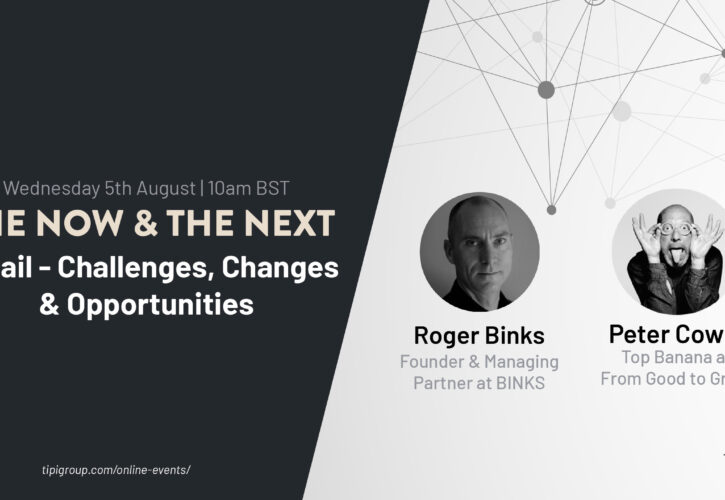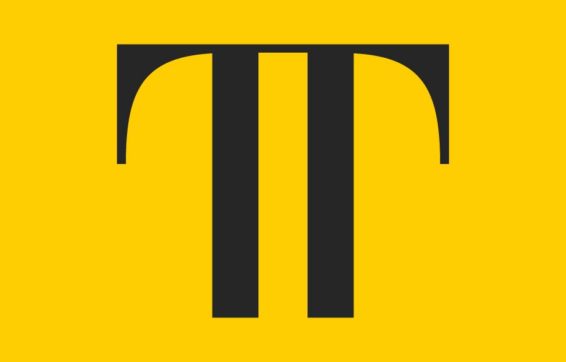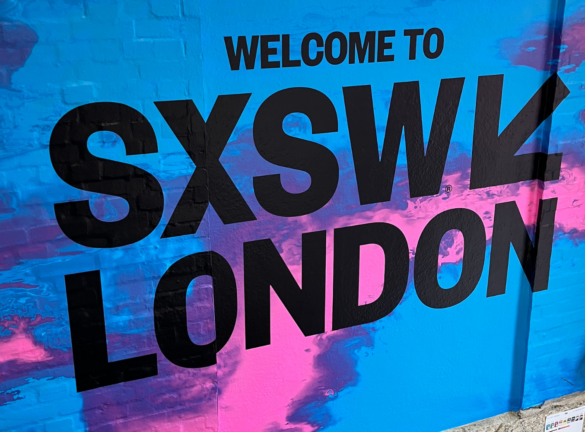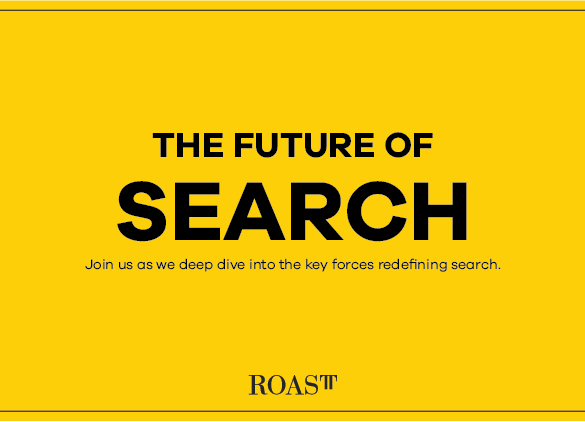
The Now & The Next: Retail – Challenges, Changes & Opportunities
On the 5th of August Peter Cowie sat down for a one on one Q&A session with Roger Binks in our seventh episode of ‘The Now & The Next’.
The pair discussed the changes, opportunities and challenges the retail industry is facing, business innovation taking place as a result of the pandemic and how Roger found and created work, including launching a new venture, after finding himself redundant after 20 years of continuous employment.
Previously working for the likes of Dixons, Marriott, Regus (IWG) and Intu, Roger gave an insight into dealing with redundancy and how it inspired him to lead his latest venture: BINKS – his consultancy that builds bespoke solutions to connect experience with value.
A video of the session is available to watch here, and the key points are copied below:
Peter Cowie: So Roger, as we know you cut your teeth in retail at Dixons and then moved on Regus. What can you tell us about your time at Regus?
Roger Binks: Well Regus, led by Mark Dixon, was the first company to realise the potential of flexible and co-working office space. It was a really exciting place to work. It was very intense, but ultimately it was a company that was relentlessly focussed on business performance, and that culture is what has enabled them to see off challenges from people like WeWork.
PC: With more and more people working from home, ‘the office’ as a concept is coming under a lot of scrutiny at the moment. What do you think the future of the office will look like?
RB: It’s an interesting one. It does seem that a lot of people have quickly got very comfortable working from home and now don’t want to return to the office at all and equally on the other hand there are a lot of people itching to get back in and see their colleagues face-to-face. Drilling down into it a bit deeper, IWG ran a survey recently which revealed that it wasn’t being in the office that people were afraid of so much, it was the commute. The idea of the commuter train or the underground and the number of strangers you my encounter there is scary because it’s essentially a situation that is out of your control as an individual.
I think what we’ll find is people still want to leave their homes to go to work, but they don’t want to travel so far, so smaller scale local co-working spaces, rather than huge city centre developments, may well increase in popularity.
With many businesses not renewing their office leases and not having these fixed contracts and central offices, it’s a very exciting time for co-working spaces, especially with the amount of multi-purpose building that is going on and the amount of ex-retail property that is being opened up for different uses. Westfield for example are converting a huge House of Fraser into mainly co-working space.
PC: So after your time at Regus you went to Intu, which was the biggest shopping centre company in the UK, what was that like?
RB: Intu was a strange one, because the role found me really. The brief was essentially to come in as a CX Director and build a team and deliver a CX programme. It was a huge job as we had about 400 million shopping visits a year at that time and the task was to build the first shopping centre brand and deliver a consistent customer experience across every one of these visits.
We created a CX programme and replicated it across every centre, gathering data and uncovering insights as we went along. We made an NPS tracker and also got a lot of rich verbatim consumer feedback. Alongside this we also brought a shopping centre brand onto TV for the first time in order to try to hit our brand saliency target.
PC: What was going on in the digital space while you were at Intu?
RB: Well we acquired a business in order to help us out with digital development, and Intu.co.uk was originally a marketplace model, which then pivoted to an affiliate model, meaning you could visit all the shops online. We also allowed pure-play retailers to list on the site which was very effective for them.
PC: Over the past couple of months Intu seems to have come to its end. Obviously it’s a pretty sad time for you and a lot of other people who worked there so I don’t want to dwell on it too much, but what do you think will happen to all the shopping centres?
RB: They won’t close. I think they will have a new owner. Maybe the Intu brand will disappear and they will go back to their old brands.
PC: And do you think the rentable model will change?
RB: Absolutely yes. We’ve already seen The Crown Estate, which owns a lot of Regent Street, switch to a variable model based on turnover rather than a long-term fixed rate and I think that is going to become industry standard. With the long contracts, income used to be almost guaranteed for years in advance but that will cease to be the case. Just look at Apple, even though the had a good lockdown they’re still demanding a 50% rent reduction.
PC: So, let’s talk about redundancy. What happened?
RB: Well it happened just before the start of lockdown. I had been working non-stop for 20 years so I decided now was the time to create something. I began working on the idea of a consultancy, sat down with a couple of agencies and created BINKS. At the moment, it’s just me, so you’re buying my years of expertise across CX, Commercial Development, Brand Purpose, Brand Management, Marketing Strategy and Business and People Management.
I’ve been keeping busy since March, of course getting BINKS up and running, and also producing some research into queuing and how shopping habits are changing. We’ve seen a lot of shifting behaviours, of course with people shopping online more and much lower footfall.
There are of course some positives that can come out of these changes, such as with less people being in store there is a better opportunity to deliver a really excellent Customer Experience, and with less browsers conversion rates are likely to go up. Also there is now a much lower cost of entry for small businesses to get into highstreets and a huge amount of potential in certain categories, we saw Selfridges just the other day start selling bikes for the first time and there’s now an e-scooter shop that is rolling out across the UK. We’ve also seen John Lewis create virtual personal shopping experiences over Zoom in a way that seems to really be working.
Question from the floor: Roger, if you were going to build a new shopping centre now what would it look like?
RB: Out of town, retractable roof, lots of activities on offer. More of a market feel with local businesses present, particularly food businesses. Easily accessible by means other than just car.
Question from the floor: How will binge impulse retailers like Primark cope with sustained reduced footfall?
RB: Well apparently Primarks have been very busy recently, but I think eventually they will be forced into digital.
PC: Any final words Roger?
RB: Just finally on redundancy; it’s bad, but it doesn’t mean you’re bad, it’s just the situation you’re in. Try to network as much as possible and you’ll find your way out of it.
Thank you to Peter and Roger for the great session. Want more The Now & the Next content? Read our summary of our previous session, focussing on the Finance industry.
To watch the videos of all of our previous sessions, go to the TIPi Group events page.






